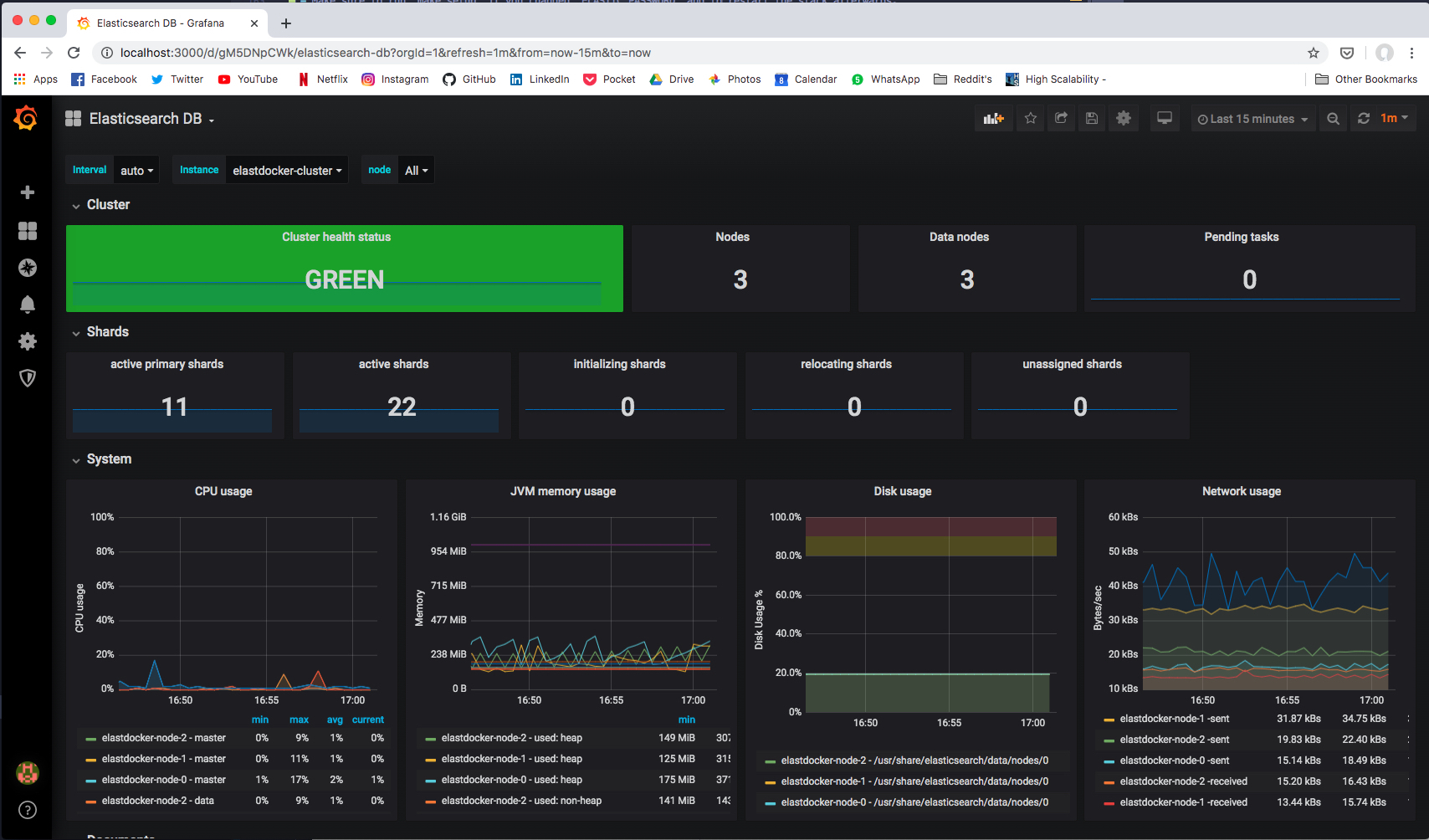Configured to be ready to be used for Log, Metrics, APM, Alerting, Machine Learning, and Security (SIEM) usecases.
Elastic Stack (ELK) Docker Composition, preconfigured with Security, Monitoring, and Tools; Up with a Single Command.
Suitable for Demoing, MVPs and small production deployments.
Stack Version: 8.3.2 🎉 - Based on Official Elastic Docker Images
You can change Elastic Stack version by setting
ELK_VERSIONin.envfile and rebuild your images. Any version >= 8.0.0 is compatible with this template.
- Configured as a Production Single Node Cluster. (With a multi-node cluster option for experimenting).
- Security Enabled By Default.
- Configured to Enable:
- Logging & Metrics Ingestion
- APM
- Alerting
- Machine Learning
- SIEM
- Enabling Trial License
- Use Docker-Compose and
.envto configure your entire stack parameters. - Persist Elasticsearch's Keystore and SSL Certifications.
- Self-Monitoring Metrics Enabled.
- Prometheus Exporters for Stack Metrics.
- Collect Docker Host Logs to ELK via
make collect-docker-logs. - Embedded Container Healthchecks for Stack Images.
- Rubban for Kibana curating tasks.
And comparing Elastdocker and the popular deviantony/docker-elk
Expand...
One of the most popular ELK on Docker repositories is the awesome deviantony/docker-elk.
Elastdocker differs from deviantony/docker-elk in the following points.
-
Security enabled by default using Basic license, not Trial.
-
Persisting data by default in a volume.
-
Run in Production Mode (by enabling SSL on Transport Layer, and add initial master node settings).
-
Persisting Generated Keystore, and create an extendable script that makes it easier to recreate it every-time the container is created.
-
Parameterize credentials in .env instead of hardcoding
elastich:changemein every component config. -
Parameterize all other Config like Heap Size.
-
Add recommended environment configurations as Ulimits and Swap disable to the docker-compose.
-
Make it ready to be extended into a multinode cluster.
-
Configuring the Self-Monitoring and the Filebeat agent that ship ELK logs to ELK itself. (as a step to shipping it to a monitoring cluster in the future).
-
Configured tools and Prometheus Exporters.
-
The Makefile that simplifies everything into some simple commands.
- Docker 20.05 or higher
- Docker-Compose 1.29 or higher
- 4GB RAM (For Windows and MacOS make sure Docker's VM has more than 4GB+ memory.)
-
Clone the Repository
git clone https://github.com/sherifabdlnaby/elastdocker.git
-
Initialize Elasticsearch Keystore and TLS Self-Signed Certificates
$ make setup
For Linux's docker hosts only. By default virtual memory is not enough so run the next command as root
sysctl -w vm.max_map_count=262144 -
Start Elastic Stack
$ make elk <OR> $ docker-compose up -d
-
Visit Kibana at https://localhost:5601 or
https://<your_public_ip>:5601Default Username:
elastic, Password:changeme- Notice that Kibana is configured to use HTTPS, so you'll need to write
https://beforelocalhost:5601in the browser. - Modify
.envfile for your needs, most importantlyELASTIC_PASSWORDthat setup your superuserelastic's password,ELASTICSEARCH_HEAP&LOGSTASH_HEAPfor Elasticsearch & Logstash Heap Size.
- Notice that Kibana is configured to use HTTPS, so you'll need to write
Whatever your Host (e.g AWS EC2, Azure, DigitalOcean, or on-premise server), once you expose your host to the network, ELK component will be accessible on their respective ports. Since the enabled TLS uses a self-signed certificate, it is recommended to SSL-Terminate public traffic using your signed certificates.
🏃🏻♂️ To start ingesting logs, you can start by running
make collect-docker-logswhich will collect your host's container logs.
Expand
$ make monitoring$ make tools$ make collect-docker-logs$ make all
$ make nodes$ make build$ make down$ make prune- Some Configuration are parameterized in the
.envfile.ELASTIC_PASSWORD, userelastic's password (default:changemepls).ELK_VERSIONElastic Stack Version (default:8.3.2)ELASTICSEARCH_HEAP, how much Elasticsearch allocate from memory (default: 1GB -good for development only-)LOGSTASH_HEAP, how much Logstash allocate from memory.- Other configurations which their such as cluster name, and node name, etc.
- Elasticsearch Configuration in
elasticsearch.ymlat./elasticsearch/config. - Logstash Configuration in
logstash.ymlat./logstash/config/logstash.yml. - Logstash Pipeline in
main.confat./logstash/pipeline/main.conf. - Kibana Configuration in
kibana.ymlat./kibana/config. - Rubban Configuration using Docker-Compose passed Environment Variables.
You can extend the Keystore generation script by adding keys to ./setup/keystore.sh script. (e.g Add S3 Snapshot Repository Credentials)
To Re-generate Keystore:
make keystore
-
⚠️ Elasticsearch HTTP layer is using SSL, thus mean you need to configure your elasticsearch clients with theCAinsecrets/certs/ca/ca.crt, or configure client to ignore SSL Certificate Verification (e.g--insecureincurl). -
Adding Two Extra Nodes to the cluster will make the cluster depending on them and won't start without them again.
-
Makefile is a wrapper around
Docker-Composecommands, usemake helpto know every command. -
Elasticsearch will save its data to a volume named
elasticsearch-data -
Elasticsearch Keystore (that contains passwords and credentials) and SSL Certificate are generated in the
./secretsdirectory by the setup command. -
Make sure to run
make setupif you changedELASTIC_PASSWORDand to restart the stack afterwards. -
For Linux Users it's recommended to set the following configuration (run as
root)sysctl -w vm.max_map_count=262144By default, Virtual Memory is not enough.
Head to Stack Monitoring tab in Kibana to see cluster metrics for all stack components.
In Production, cluster metrics should be shipped to another dedicated monitoring cluster.
If you started Prometheus Exporters using make monitoring command. Prometheus Exporters will expose metrics at the following ports.
| Prometheus Exporter | Port | Recommended Grafana Dashboard |
|---|---|---|
elasticsearch-exporter |
9114 |
Elasticsearch by Kristian Jensen |
logstash-exporter |
9304 |
logstash-monitoring by dpavlos |
MIT License Copyright (c) 2020 Sherif Abdel-Naby
PR(s) are Open and Welcomed.















